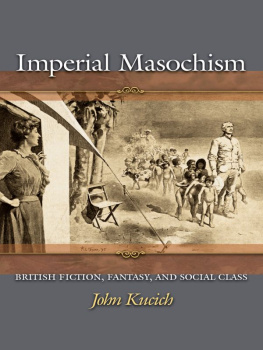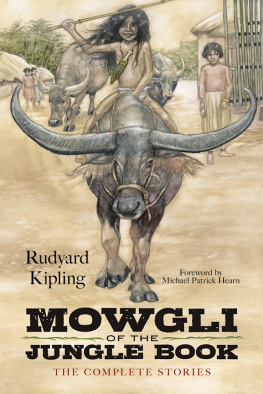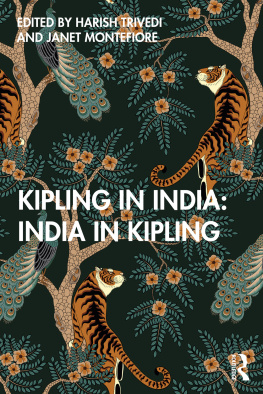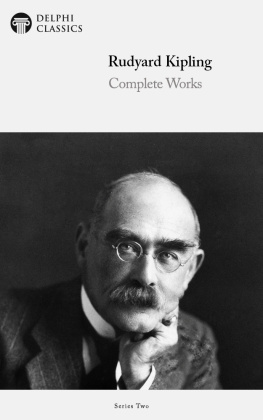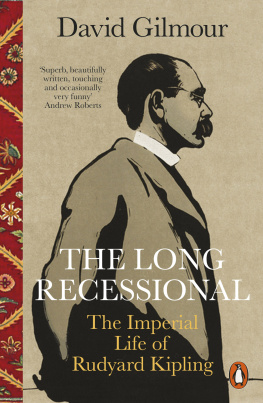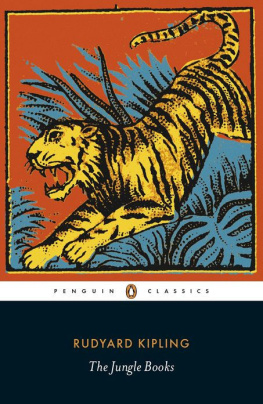OXFORD WORLDS CLASSICS
THE JUNGLE BOOKS
RUDYARD KIPLING (18651936) was born in Bombay in December 1865. He returned to India from England in the autumn of 1882, shortly before his seventeenth birthday, to work as a journalist first on the Civil and Military Gazette in Lahore, then on the Pioneer at Allahabad. The poems and stories he wrote over the next seven years laid the foundation of his literary reputation, and soon after his return to London in 1889 he found himself world-famous. Throughout his life his works enjoyed great acclaim and popularity, but he came to seem increasingly controversial because of his political opinions, and it has been difficult to reach literary judgements unclouded by partisan feeling. The Oxford Worlds Classics series provides the opportunity for reconsidering his remarkable achievement.
W. W. ROBSON was a Fellow of Lincoln College, Oxford from 1948 to 1970, and a Professor at the University of Sussex from 1970 to 1972. Since 1972 he held the Mason Chair of English Literature at the University of Edinburgh. He died in 1993. His editions of G. K. Chestertons Father Brown and Arthur Conan Doyles The Hound of the Baskervilles are also in Oxford Worlds Classics.
OXFORD WORLDS CLASSICS
For over 100 years Oxford Worlds Classics have brought readers closer to the worlds great literature. Now with over 700 titlesfrom the 4,000-year-old myths of Mesopotamia to the twentieth centurys greatest novelsthe series makes available lesser-known as well as celebrated writing.
The pocket-sized hardbacks of the early years contained introductions by Virginia Woolf, T. S. Eliot, Graham Greene, and other literary figures which enriched the experience of reading. Today the series is recognized for its fine scholarship and reliability in texts that span world literature, drama and poetry, religion, philosophy, and politics. Each edition includes perceptive commentary and essential background information to meet the changing needs of readers.
Refer to the to navigate through the material in this Oxford Worlds Classics ebook. Use the asterisks (*) throughout the text to access the hyperlinked Explanatory Notes.
OXFORD WORLDS CLASSICS

RUDYARD KIPLING
The Jungle Books

Edited with an Introduction and Notes by
W. W. ROBSON


Great Clarendon Street, Oxford OX2 6DP
Oxford University Press is a department of the University of Oxford.
It furthers the Universitys objective of excellence in research, scholarship,
and education by publishing worldwide in
Oxford New York
Athens Auckland Bangkok Bogot Buenos Aires Calcutta
Cape Town Chennai Dar es Salaam Delhi Florence Hong Kong Istanbul
Karachi Kuala Lumpur Madrid Melbourne Mexico City Mumbai
Nairobi Paris So Paulo Shanghai Singapore Taipei Tokyo Toronto Warsaw
with associated companies in Berlin Ibadan
Oxford is a registered trade mark of Oxford University Press
in the UK and in certain other countries
Published in the United States
by Oxford University Press Inc., New York
Introduction, Explanatory Notes Wallace Robson 1987
General Editors Preface, Select Bibliography, Chronology
Andrew Rutherford 1987
Updated Bibliography Andrew Rutherford 1996
Appendix Aubrey Manning 1987
The moral rights of the author have been asserted
Database right Oxford University Press (maker)
First published as a Worlds Classics paperback 1992
Reissued as an Oxford Worlds Classics paperback 1998
All rights reserved. No part of this publication may be reproduced, stored in a retrieval system, or transmitted, in any form or by any means, without the prior permission in writing of Oxford University Press, or as expressly permitted by law, or under terms agreed with the appropriate reprographics rights organizations. Enquiries concerning reproduction outside the scope of the above should be sent to the Rights Department, Oxford University Press, at the address above
You must not circulate this book in any other binding or cover
and you must impose this same condition on any acquirer
British Library Cataloguing in Publication Data
Data available
Library of Congress Cataloging in Publication Data
Kipling, Rudyard, 18651936.
The jungle books/Rudyard Kipling; edited with an introduction by W. W. Robson.
p. cm.(Oxford worlds classics)
Includes bibliographical references (p.).
Summary: Presents the adventures of Mowgli, a boy reared by a pack of wolves
and the wild animals of the jungle. Also includes other short stories set in India.
1. Mowgli (Fictitious character)Fiction. 2. AnimalsFiction.
3. IndiaFiction. [1. JunglesFiction. 2. AnimalsFiction.
3. IndiaFiction. 4. Short stories.] I. Robson, W. W (William
Wallace), 1923. II. Title. III. Series.
PR4854J6 1992 823.8dc20 918905
ISBN 0192835033
3 5 7 9 10 8 6 4
Printed in Great Britain by
Cox & Wyman Ltd.
Reading, Berkshire
CONTENTS
GENERAL PREFACE
RUDYARD KIPLING (18651936) was for the last decade of the nineteenth century and at least the first two decades of the twentieth the most popular writer in English, in both verse and prose, throughout the English-speaking world. Widely regarded as the greatest living English poet and story-teller, winner of the Nobel Prize for Literature, recipient of honorary degrees from the Universities of Oxford, Cambridge, Edinburgh, Durham, McGill, Strasbourg, and the Sorbonne, he also enjoyed popular acclaim that extended far beyond academic and literary circles.
He stood, it can be argued, in a special relation to the age in which he lived. He was primarily an artist, with his individual vision and techniques, but his was also a profoundly representative consciousness. He seems to give expression to a whole phase of national experience, symbolizing in appropriate forms (as Lascelles Abercrombie said the epic poet must do) the sense of the significance of life he [felt] acting as the unconscious metaphysic of the time. He is in important ways a spokesman for his age, with its sense of imperial destiny, its fascinated contemplation of the unfamiliar world of soldiering, its confidence in engineering and technology, its respect for craftsmanship, and its dedication to Carlyles gospel of work. That age is one about which many Britonsand to a lesser extent Americans and West Europeansnow feel an exaggerated sense of guilt; and insofar as Kipling was its spokesman, he has become our scapegoat. Hence, in part at least, the tendency in recent decades to dismiss him so contemptuously, so unthinkingly, and so mistakenly. Whereas if we approach him more historically, less hysterically, we shall find in this very relation to his age a cultural phenomenon of absorbing interest.
An innovator and a virtuoso in the art of the short story, Kipling does more than any of his predecessors to establish it as a major genre. But within it he moves confidently between the poles of sophisticated simplicity (in his earliest tales) and the complex, closely organized, elliptical and symbolic mode of his later works which reveal him as an unexpected contributor to modernism.
He is a writer who extends the range of English literature in both subject-matter and technique. He plunges readers into new realms of imaginative experience which then become part of our shared inheritance. His anthropological but warmly human interest in mankind in all its varieties produces, for example, sensitive, sympathetic vignettes of Indian life and character which culminate in
Next page

